One Roll Only
- Malin Freeborn
- November 25, 2023
RPGs should avoid asking people to roll dice more than once for any result.
Aesthetically, multiple rolls don’t feel right. Rolling dice should feel like casting rune-inscribed bones across a table.
Multiple Rolls Guarantee Success
The door is locked, but can be picked with a roll of 18 or higher.
This sounds like a tough lock to pick! …unless we have 5 people pick it, in which case it will almost definitely open, because with enough players rolling dice, someone’s going to roll 18 or higher. This means all doors open, but only on the condition that people sit around a table, rolling Maths-rocks repeatedly, until someone gets a high number.
BIND works differently. The dice do not indicate a character’s luck, but the details that nobody knows about - a high roll means the lock-picking tools are just right for this lock, while a low roll means the tools are bad, and the lock’s gone rusty.
In-game, this means that when someone rolls for an action, the result stays put. If you rolled a ‘3’ then you leave it on the table, and everyone who tries to pick the lock has also rolled a ‘3’.
This also stops that odd situation (I’m sure we’ve all seen it) where strong characters fail a roll, and then a weaker one passes it. The first time, it’s hilarious. The second, it’s not. By the third, you’re starting to wonder why you even bothered to become an expert in Crafts if everything you make crumbles at the wrong moment, because the dice are being fickle.
Rolling once and keeping that roll on the table means that unskilled characters can still succeed with a lucky roll…but they will never out-perform the experts.1
One-Action-Only Stops Players Acting
The problem above might be limited by letting only one person take an action, but this won’t work out either.
The guard at the gate raises an eyebrow. Roll Charisma + Empathy to convince him you’re legit
If we limit players to one roll to establish a settled action, then nobody should interact with this guard except the PC with the highest Charisma, because if a player with a low Charisma Bonus rolls and fails, everyone gets a bad result.
However, if we let players act any number of times by reinterpreting the same roll then the problem vanishes. If the first PC cannot convince the guard, another can still succeed.
Anyone can ‘have a go’, without penalizing the group’s situation in any way.
Multiple Rolls Guarantee Failure

You need to roll Dexterity + Stealth, and achieve 10 or more to sneak into the cast unnoticed.
With six players rolling dice, we already know that someone will fail the roll, and the guards will notice. The group have no choice but to send a single, stealthy ‘rogue’ forward to murder a guard, because groups cannot succeed in any action where everyone has to succeed.
But if the players make a single roll for the entire group, then as long as the PC with the lowest stat succeeds, they all succeed.
The group can retain individual scores, despite all using the same roll. Assuming the dice land on ‘9’, then PC with a -1 modifier has a total of ‘8’ and fails, but the next PC, with a +2 bonus, would succeed.
*“I hear footsteps”, a voice says from a window.
If guard investigate, they’ll only be looking for one intruder, not all five, so each PC’s modifiers were useful, even if the group did not succeed completely.
Well not ’never’ - experts can still gain penalties from this or that, while the unskilled my have some circumstantial bonus. But in these cases the untrained person will at least have a recognizable reason to out-perform others with more experience. ↩︎
